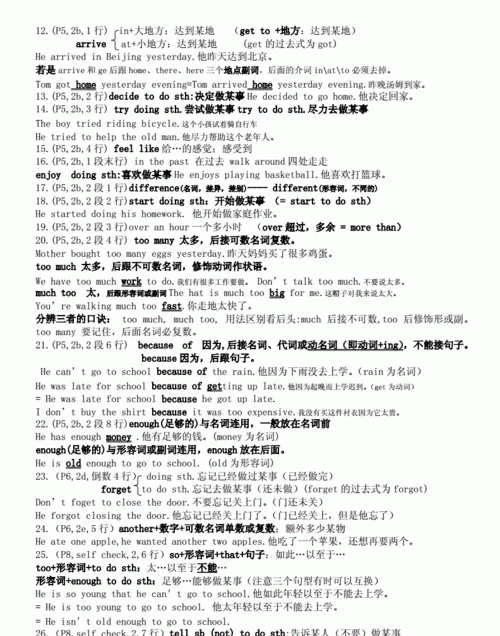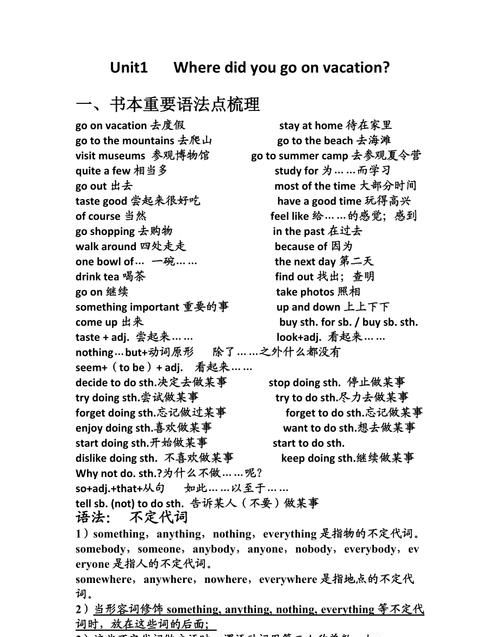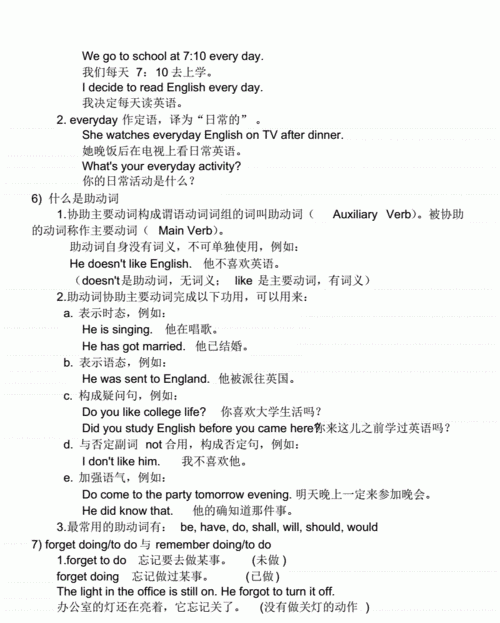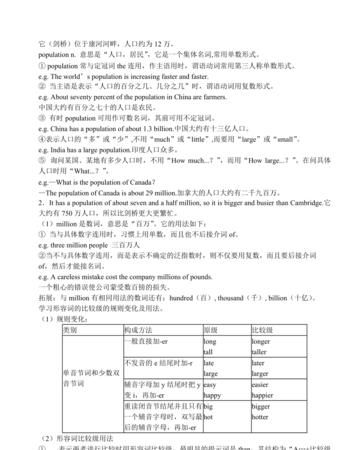本文目录
八年级上册英语语法知识点总结归纳
一、只能修饰可数名词的词语有:
many, many a(n), a good / great many, a (great / large) number of, scores of, dozens of等.例如:
Scores of people went there in the first few days after its opening.
开张后的头几天,很多人去了那儿.
I have been there dozens of times.
我已去过那儿很多次了.
There’re a number of students reading English in the classroom.
教室里有许多学生在读英语.
Many a student has(=many students have)visited the Great Wall.(谓语动词用单数)
很多学生都游览过长城.
In winter, a good many animals sleep under the snow.
冬天很多动物在雪下冬眠.
注意: many所修饰的复数名词前若有限定词,many 后面要接of, 表示“……中的很多”. 例如:
A great many(of the) graduates have found jobs.
毕业生中很多人已经找到了工作.
二、只能修饰不可数名词的词语有:
much, a great deal of, a great / large amount of等.例如:
Is there much water in the bucket?
桶里有很多水吗?
He always has a great amount of work to do.
他总是有很多工作要做.
三、既能修饰可数名词又能修饰不可数名词的词语有:
a lot of, lots of, plenty of (以上三个词语后谓语动词的数依of 后的名词的单复数而定),a great / large quantity of (其后谓语用单数),quantities of (其后谓语用复数).例如:
There is still lots of snow in the garden.
花园里还有许多雪.
There is plenty of rain here.
这儿的雨水很多.
A great quantity of flowers was placed in the hall.
大厅里放了很多鲜花.
There are large quantities of food in the cupboard.
橱柜里有许多食物.
在所有这些表示“很多”的词语中many, much 是最常用的词,它们既可以用于肯定句,也可以用于疑问句和否定句.例如:
Are there many people in the street?
街上有很多人吗?
There isn’t much time left.
剩下的时间不多了.
其它的词语都用于肯定句,日常会话中常用lots of, a lot of 或plenty of; 正式文体中常用 a great many, a (large) number of, a great deal of, scores of 或 dozens of 等.但若肯定句中有too, so, as, very或how 等词修饰时,则必须使用 many, much.例如:
The number of the people who lost their homes reached as many as 250,000.
无家可归的人数多达250,000人.
There is too much work to do.
要做的工作太多了.
或者是这样的,你自己看下,哪Unit 1 How often do you exercise?
Grammar: 特殊疑问句:wh-questions: what, who, where, when, which, whose, why, whom等.
特殊疑问句的构成及用法:
结构:特殊疑问词+ 一般疑问句, 即:特殊疑问词+be/助动词/情态动词+主语+谓语/表语(+其他)
疑问代词:
1) Who:谁.做主语,用来指人 Who is the boy under the tree?
2)Whom 谁,做宾语,用来指人 Whom are you writing to?
3) Whose 谁的,用来指所属关系,如果做定语,一般后接名词 Whose pen is this?
4) Which 哪个,哪些,用来指对人或物在一定范围之内进行选择 Which grils will in the sports meeting? Which pen is Lily’s?
5)What什么,通常指物,也可指人,一般用在没有指出范围的情况下 What can you see in the picture? What are you doing now?
疑问副词:
When:何时,询问时间 When will she come back?
Where何地,询问地点, Where do you come from?
Why为什么,询问原因, Why are you late for school?
How 如何,询问手段、方式、工具以及程度等 How do you usually go to school?
How old多大,询问年龄,How old is Jim’s little brother?
How many/much多少,询问数量 How many birds are there in the tree?
How far多远,询问距离, How far is it form your home to school?
How long多长,多久,询问时间的长度或距离 How long will you stay in Beijing?
How often多长时间按一次,询问频率 How often do you go to see your grandparents?
How soon多久,询问时间 How soon will you come back?
频率副词:表示动作发生的频率,never, sometimes, often, usually, always.
Unit 2 What’s the matter with you?
Grammar:
1. 用have 来描述身体不适 have/have got a +疾病名字;得了……病
2.情态动词should,情态动词should,can, may, must没有人称和时态的变化,后接动词原形
Unit 3 What are you doing for vacation?
Grammar:现在进行时表将来 一般将来时
表示将要做某事或计划打算做某事要用到句型“be+doing”其中be是助动词,它有人称和单复数的变化.Be: am, is, are. be + v.ing是现在进行时的形式,但用于表示将来.用进行时表将来,常用于表示即将来临的未来预定要做的事情,一般指个人计划要做的事.用于此情况的动词一般是表示位置转移的动词,如,go, come, leave, start, arrive, move等.
一.肯定句中,结构为“be+doing.”
I am going shopping this afternoon.
二.否定句是在be之后加not. I’m not going to shopping this afternoon.
三.一般疑问句是将be置于句首 Are you going shopping this afternoon?—Yes, I am/ we are. No, I’m not./ We aren’t.
四.特殊疑问句“疑问词+一般疑问句语序.”
What are you doing for vacation? When is he going camping?
Who are you going there with? Where is she going?
Unit 4 How do you get to school?
Grammar: How引导的特殊疑问句:是指以How, how far, how long, how old,how many, how much等词开头的疑问句.
How does he get to shool?---- He takes the train to get to shool.
How long does it take to walk? ----It takes about 35 minutes to walk.
How far is it from your home to school? It’s four miles from my home to school.
How old is he now? She is twelve years old now.
How many storybooks do you have? I have five storybooks.
How much is this coat? This coat is 200 yuan.
特殊疑问句的简略结构:how about…?+ 名词或动词-ing形式,用于提出建议、请求或征求意见、询问消息等.如:How about playing tennis?
Unit 5 Can you come to my party?
Grammar:情态动词can及邀请句式及其问答
情态动词can的用法:
Can 是最长用的情态动词,其后跟动词原形,can的否定形式为cannot,can’t.
can表“能力”,意思是:能,会 I can paly basketball,but I can’t swim.
can表示能力时可和be able to 互换,be able to有更多的时态,常被用来表示can所 不能表示的将来或完成的概念.E.g. They will be able to run this machine on their own in three months.
表示“可能性”,意思是:可以,可能.That big cinema can seat 5,000 people.
表示允许,意思是可以能够 You can have the book when I have finished it.
表示“惊讶、不相信等(用于疑问句、否定句或感叹句中”.意思是“会、可能.”
This can’t be true. Can it be true?
如何发出、接受和谢绝别人的邀请
表达邀请的常用句型:
Can you come to…?
Could you come to…?
Would you like to come to…?
Do you want to come to…?
接受邀请的常用句型:
Sure. Certainly. OK. I’d love to.
谢绝邀请的常用句型:
I’m sorry, I can’t. I have to…
I’m afraid I can’t. I have to…
I don’t think I can. I have to…
Unit 6 I’m more outgoing than my sister.
Grammar:形容词的比较级
规则变化、不规则变化(课本P93)
than 是比较级中最常见的标志词,意思是“比”.用于引出比较的对象.1.He draws better than me.2.You’re older than I am. You are older than me.
形容词比较级前,有时可以用much,far, a little,a bit, even, three times等词来修饰.Much 和far表示“……得多”,much better好得多,a little, a bit表示稍微,一些,一点.a little shorter, 稍微矮点;even表示“甚至,更加,还要……”even bigger还要大些,three times表示 “…三倍”,如three times bigger than 比……大三倍
Very绝不可以用来修饰比较级,very,so,too, quite 修饰原级
Unit 7 How do you make banana milk shake?
Grammar: 可数名词与不可数名词
一.可数名词
英语中的物质名词大体上可分为可数名词和不可数名词.可数名词指物体的数量可数.其单数形式可在名词前加a或an,表示一个,如a pear. 其负数形式要在词尾加-s,或-es(特殊情况除外),如two bananas, three tomatoes. Many many apples a few students few bags
二.不可数名词
1.不可数名词指物体的数量不可数.不可数名词没有单复数之分,也不能在词前直接加冠词a 或an.表示不可数名词的数量时可在不可数名词

八年级英语上册语法知识点归纳总结
人们很难接受与已有知识和 经验 相左的信息或观念,因为一个人已有的知识和观念都是经过反复筛选的。接下来我给大家分享关于 八年级 英语上册语法知识,希望对大家有所帮助!
八年级英语上册语法知识1
1. 形容词/副词的比较级和最高级的构成规则
(1)单音节词和少数以-er,-ow结尾的双音节单词,比较级在后面加-er,最高级在后面加-est。
① 单音节单词
small→smaller→smallest
short→shorter→shortest
tall→taller→tallest
great→greater→greatest
② 少数以-er,-ow结尾的双音节单词
clever→cleverer→cleverest
narrow→narrower→narrowest
(2)以不发音e结尾的单音节单词,比较级在原形后加-r,最高级在原级后加-st。
large→larger→largest
nice→nicer→nicest
able→abler→ablest
(3)以一个辅音字母结尾的闭音节(即:辅音+元音+辅音)单词中,先双写末尾的辅音字母,比较级加-er,最高级加-est。
big→bigger→biggest
hot→hotter→hottest
fat→fatter→fattest
(4)以“辅音字母+y”结尾的双音节词, 把y改为i,比较级加-er,最高级加-est。
easy→easier→easiest
heavy→heavier→heaviest
busy→busier→busiest
happy→happier→happiest
(5)其他双音节词和多音节词,比较级在前面加more,最高级在前面加most。
beautiful→more beautiful→most beautiful
different→more different→most different
easily→more easily→most easily
(6)有少数形容词、副词的比较级和最高级是不规则的,必须熟记。
good→better→best
well→better→best
bad→worse→worst
ill→worse→worst
old→older/elder→oldest/eldest
many/much→more→most
little→less→least
far →further/farther→ furthest/farthest
2. 形容词和副词比较级的用法
(1)“甲+be+(倍数)+形容词比较级+than+乙”表示“甲比乙…”或“甲比乙…几倍”。
Tom is taller than Kate.
汤姆比凯特高。
This room is three times bigger than that one.
这个房间比那个大三倍。
(2)“甲+实意动词+(倍数)+副词比较级+than+乙”表示“甲比乙…”或“甲比乙…几倍”。
I got up earlier than my mother this morning.
我今天早晨起床比我妈妈还早。
He runs three times faster than his brother.
他跑的速度比他弟弟快三倍。
3. 形容词和副词最高级的用法
(1)“主语+be+the+形容词最高级(+单数名词)+in/of...”表示“……是……中最……的”。
Tom is the tallest in his class./of all the students.
汤姆是他们班上/所有学生当中最高的。
This apple is the biggest of the five.
这个苹果是五个当中最大的。
(2)“主语+实意动词+(the)+副词最高级+in/of...”表示“……是……中最……的”。
I jump (the) farthest in my class.
我是我们班跳得最远的。
八年级英语上册语法知识2
1.主语: 句子 所陈述的对象。
2.谓语:主语发出的动作。一般是有动作意义的动词。
3. 宾语:分为动词宾语和介词宾语,属于动作的承受者。
4. 系动词:表示状态或状态变化的动词,没有实际的动作意义。如 be, 感官系动词(look, sound, smell, taste 和 feel)、保持类系动词(keep, stay 和 remain)、状态变化类系动词(become、get、turn 和 go)等。
5. 表语:紧跟系动词后面的成分。
6. 定语:修饰名词或代词的成分。
7. 状语: 修饰形容词、副词、动词或句子的成分。
8. 补语:分为宾语补足语和主语补足语。是对宾语和主语的补充说明,与其有主动或被动的逻辑关系。
例如:You should keep the room clean and tidy.
你应该让屋子保持干净整洁。
(You是主语, should keep是谓语,the room是宾语,clean and tidy是宾语补足语。)
This kind of food tastes delicious.
这种食物吃起来很可口。
(This kind of food是主语, tastes是系动词, delicious是表语。)
注意:主语、谓语、宾语、系动词、表语、补语是一个句子的主干成分;定语和状语是一个句子的修饰性成分,不是主干成分。
八年级英语上册语法知识3
1.“主语 + 谓语”(即“主谓”句型)
例:They arrived in Harbin yesterday morning.
分析:“they”(主语)“arrived”(谓语)。
2.“主语 + 谓语 + 宾语”(即“主谓宾”句型)
例:I study English.
分析:“I”(主语)“study”(谓语动作)“English”(宾语即动作涉及的对象)。
3.“主语 + 谓语 + 间接宾语 + 直接宾语”(即“主谓双宾”句型)
例:Our teacher taught us English.
分析:“our teacher”(主语)“教”(谓语动作)“us”(间接宾语)“English”(直接宾语)。
4.“主语 + 谓语 + 宾语 + 宾语补足语”(即“主谓宾宾补”句型)
例: He asked her to go there.
分析:“he”(主语)“asked”(谓语动作)“her”(宾语即动作涉及的对象)“to go there”(补语—补充说明宾语做什么)。
5.“主语 + 系动词+ 表语”(即“主系表”句型)
常用的系动词有be, keep,lie, remain, stand, become, fall, get, go, grow, turn, look, feel, seem, smell, sound, taste, 等。
例: I am a teacher. 我是一名老师
分析:“I”(主语)“am”(系动词)“a teacher”(表语—即表明主语的身份)。
八年级英语上册语法知识点相关 文章 :
★ 八年级上册英语语法整理
★ 八年级英语语法知识点归纳总结
★ 初二英语语法知识点汇总
★ 八年级英语上册知识点归纳
★ 八年级英语上册知识点归纳小结
★ 八年级英语语法知识点
★ 最新人教版八年级上册英语知识点
★ 初中八年级英语语法知识点整理
★ 八年级上册英语知识点

人教版八年级上册英语语法点归纳
这篇文章汇总归纳了八年级上册英语语法的重要知识点,一起看一下具体内容,供参考。
特殊疑问句
1.结构:特殊疑问词+一般疑问句,即:特殊疑问词+be/助动词/情态动词+主语+谓语/表语(+其他)
2.疑问代词:
1)Who 谁。做主语,用来指人:Who is the boy under the tree?
2)Whom 谁,做宾语,用来指人:Whom are you writing to?
3)Whose 谁的,用来指所属关系,如果做定语,一般后接名词:Whose pen is this?
4)Which 哪个,哪些,用来指对人或物在一定范围之内进行选择;Which pen is Lily’s?
5)What什么,通常指物,也可指人,一般用在没有指出范围的情况下:What can you see in the picture? What are you doing now?
3.疑问副词:
1)When 何时,询问时间:When will she come back?
2)Where 何地,询问地点:Where do you come from?
3)Why 为什么,询问原因:Why are you late for school?
4)How 如何,询问手段、方式、工具以及程度等:How do you usually go to school?
5)How old 多大,询问年龄:How old is Jim’s little brother?
6)How many/much 多少,询问数量:How many birds are there in the tree?
7)How far 多远,询问距离:How far is it form your home to school?
8)How long 多长,多久,询问时间的长度或距离:How long will you stay in Beijing?
9)How often 多长时间按一次,询问频率:How often do you go to see your grandparents?
10)How soon 多久,询问时间:How soon will you come back?
现在完成时
1.过去发生或完成的动作对现在造成了一定的影响和后果;
2.结构:由助动词have/has+动词的过去分词构成;
肯定句
现在完成时的肯定句式是“have(has)+过去分词”。
注意:该句式中的have或has是助动词,has用于第三人称单数,其它人称一律用have。
疑问句
现在完成时的一般疑问句式是把助动词have或has提到主语之前。
回答:Yes, … have(has).
No, … haven’t(hasn’t).
否定句:
现在完成时的否定句式是“haven't(hasn't)+过去分词”。
3.现在完成时的时间状语:already, just, yet, since, ever, never;
4.与一般过去时的区别:一般过去时是强调动作在过去发生,而现在完成时是强调过去发生的动作对现在造成了影响和后果。
5.一般过去时的时间状语:yesterday, just now, …ago, last week,2 years ago,in 1980等。
过去进行时
1.基本概念
表示在过去某一具体时间内的某一持续性行为,即过去某一时刻或某一段时间内正在进行的动作。常和表示过去时间的词组或从句连用。
2.基本结构:be动词的过去式was/were+现在分词,即:was/were+doing。
was用于第一人称及第三人称单数,were用于第二人称及复数。
3.基本用法
(1)表示过去某时间正在进行的动作或持续的行为,常和表过去的时间状语连用。
I was doing my homework at this time yesterday.昨天的这个时候我正在做作业。
(2)可用来为另一个动作的发生提供背景。表示背景的句子通常用过去进行时,而另一个句子则用一般过去时。
He hurt his leg when he was riding a bike.他在骑车时把腿摔坏了。

八年级上册英语知识点归纳
英语语言知识点教学对学生英语基础知识的积累以及英语语言能力的提高有举足轻重的作用。那么八年级上册英语知识点归纳该怎么写呢?下面是我为大家整理的八年级上册英语知识点归纳,希望对大家有帮助。
八年级上册英语知识点归纳篇一
Unit1 Where did you go on vacation?
短语归纳
go on vacation去度假 stay at home待在家里 go to the mountains去爬山
go to the beach去海滩 visit museums 参观博物馆 go to summer camp去参观夏令营 quite a few相当多 study for为……而学习 go out出去 most of the time大部分时间 taste good尝起来很好吃 have a good time玩得高兴 of course当然 in the past在过去 feel like给……的感觉;感受 go shopping去购物 walk around四处走走 because of因为 one bowl of… 一碗…… the next day第二天 drink tea喝茶 find out找出;查明 go on继续 take photos照相 something important重要的事 up and down上上下下 come up出来 buy sth. for sb. / buy sb. sth.为某人买某物 taste + adj. 尝起来…… look+adj. 看起来…… nothing…but+动词原形 除了……之外什么都没有
seem+(to be)+ adj. 看起来…… arrive in+大地点 / arrive at+小地点 到达某地 decide to do sth.决定去做某事 try doing sth.尝试做某事 / try to do sth.尽力去做某事
forget doing sth.忘记做过某事/ forget to do sth.忘记做某事 enjoy doing sth.喜欢做某事 want to do sth.想去做某事 start doing sth.开始做某事 stop doing sth. 停止做某事 dislike doing sth. 不喜欢做某事 keep doing sth.继续做某事
Why not do. sth.?为什么不做……呢? so+adj.+that+从句 如此……以至于……
tell sb. (not) to do sth. 告诉某人(不要)做某事
语法讲解
1. go on vacation 度假 vacation相当于holiday,但vacation表示长的假期。
4. something interesting有趣的东西
1)something,anything,nothing,everything是指物的不定代词。
somebody,someone,anybody,anyone,nobody,everybody,everyone是指人的不定代词。 somewhere,anywhere,nowhere,everywhere是指地点的不定代词。
2)当形容词修饰不定代词、不定副词时,放于其后; something special; somewhere wonderful.
3)不定代词、不定副词做主语时,谓语动词用第三人称单数。如:大家都到齐了吗?
4)something,somebody,someone,somewhere用于肯定句及表示请求或建议的疑问句中
anything,anybody,anyone,anywhere用于否定句、疑问句及条件状语从句中。如: 你做了有趣的事吗?(表疑问)
Why don‘t you visit 你为什么不跟我一起去拜访下某个人呢?(表建议) If anything happens, please tell me. 如果有事情发生,请告诉我。
6. buy sth. for sb. 或 buy sb. sth 如: buy some books for me. = buy me some books.
7.提建议的句子: 8. ride bicycles 骑自行车
① 如:What/ How about going shopping? ②Why don‘t you + do sth.? 如:Why don‘t you go shopping?
③ 如:Why not go shopping?
④Let‘s + do sth. 如: Let‘s go shopping
⑤ 如:Shall we/ I go shopping?
13. 辨析: get to/reach/arrive 都是―到达―的意思
get to+地点=reach+地点= arrivve at+地点(小)=arrive in+地点(大)
注意:若他们后面要加地点副词here, there, home等,则不需要加介词。
14.nothing...but...意为―除......之外; 只有‖,如:
求知学堂英语免费考前辅导资料(内部教材) 姓名:
such such+名短+ that 从句:She is such a popular girl that...
so that 从句:结果…(为了) 如:He gets up early so that he can catch the early bus. 反身代词:myself/yourself/itself/herself/himself/ourselves/yourselves/themselves
如:
The child (herself) usually wears the clothes (herself).
27.What a difference a day makes!
一天的差异多大啊!
What a/an + adj.+ n(单)+主+谓!或 What + adj. +n(复不)+主+谓!
How+ adj. +主+谓(联系动词)!或 How + adv+主+谓(实义动词)!
八年级上册英语知识点归纳篇二
Unit2 How often do you exercise?
短语归纳
help with housework帮助做家务 on weekends在周末 how often多久一次
hardly ever几乎从不 once a week每周一次 twice a month每月两次 every day每天 be free有空 go to the movies去看电影 use the Internet用互联网 swing dance摇摆舞 play tennis打网球 stay up late熬夜;睡得很晚 at least至少
have dance and piano lessons上舞蹈课和钢琴课 go to bed early早点睡觉
play sports进行体育活动 be good for对……有好处 go camping去野营
not…at all一点儿也不…… in one‘s free time在某人的业余时间 the most popular最受欢迎的 such as比如;诸如 old habits die hard积习难改 go to the dentist去看牙医
morn than多于;超过 less than少于 help sb. with sth.帮助某人做某事
How about…? ......怎么样?/ ……好不好? want sb. to do sth.想让某人做某事
How many+可数名词复数+一般疑问句? ……有多少……?
主语+find+that从句. ……发现…… spend time with sb.和某人一起度过时光
It‘s+ adj.+ to do sth. 做某事的……的。 ask sb. about sth.向某人询问某事
by doing sth. 通过做某事 What‘s your favorite……?你最喜爱的……是什么?
the best way to do sth.做某事的最好方式
语法讲解
1. exercise (v/n)的用法
1)(动):锻炼. 如: He exercises every day.
2) (可数名词):―...操;练习‖. 如:do morning/ eye exercises; do math exercises
(不可数名词):―锻炼;运动‖讲:如: We often do / take exercise on weekends.
2. ----How often do you usually go shopping? —Sometimes/Twice a week. 有时候/一周两次.
1) go shopping 意为―去购物‖。Go+ v- ing : 表示进行某项活动。如:
Go swimming/ shopping/skating/skiing/fishing/climbing/hiking
2)频率副词:always=all the time, usually, often, sometimes=at times , hardly ever, never
(1).sometimes: 有时候;sometime:某时;some t
imes:许多次/倍; some time: 一段时间
(2). hardly(adv): 几乎不 硬的;困难的;严厉的;勤奋的 a hard writer study/rain hard 3)how often表示―多久一次‖,是对动作的频率进行提问。其回答通常有:
频率副词: always, usually, often, sometimes, hardly ever, never
how often 次数+时间段: 如:once or twice a week
every +时间段: every day (每天) 区别:everyday(每天的;日常的)
―一次或两次‖时,一般用once和twice表示。如:once a month(一个月一次)
而表示―三次或以上‖时,则用―数词+times‖结构。如:five times a year (一年五次)
4) 由how构成的疑问词组的用法
猜你喜欢:
1. 初二上册英语知识点的重点总结
2. 八年级英语上册知识点
3. 八年级上册英语知识点
4. 初二上英语知识点归纳总结
5. 初二英语上册知识点总结
6. 八年级上册英语重点短语及句型总结

以上就是关于八年级上册英语语法总结归纳 ,八年级上册英语语法知识点总结归纳的全部内容,以及八年级上册英语语法总结归纳 的相关内容,希望能够帮到您。

